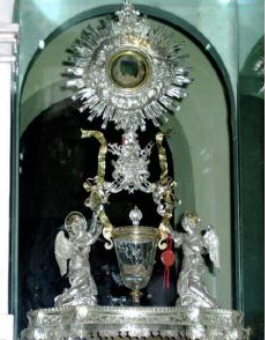

Welcome to the Parish Family of
St. Margaret of Cortona
in Little Ferry

ANNOUNCEMENTS
We Are His Witnesses: A Pastoral Letter from Cardinal Tobin
As we welcome the New Year, Cardinal Tobin invites all Catholics in the Archdiocese of Newark to read We Are His Witnesses, his pastoral letter outlining new pathways for the future of the Archdiocese. Rooted in Pope Francis’ call for pastoral conversion, missionary discipleship, and synodality, the letter reflects on our shared journey of faith and calls us to embrace renewal, collaboration and missionary outreach. This multi-year initiative will guide us in shaping a vibrant, hopeful future for our Church community.
Click to read We Are His Witnesses and join this journey of faith as we respond to Christ’s call to be His witnesses in the world.
Catholic Charities
Catholic Charities USA supports a national network of agencies committed to encountering those along the margins, regardless of their faith.
Want to help victims of recent hurricanes? Click on this link: https://www.catholiccharitiesusa.org/
Welcome New Parishioners
Register with us by filling up this form and dropping it in the collection basket or at the Parish Office. Click on the form below to download.

Music is an extremely important part of liturgy at the Parish of St. Margaret of Cortona and we are looking for enthusiastic music lovers and musicians to join our music ministry.
ALL ARE WELCOME!
St. Margaret of Cortona’s choir sings at the 11:30 Mass every Sunday and at other liturgies throughout the year. Rehearsals are held every Thursday at 7:30 pm beginning in September and through the month of June. No experience is necessary. Let us make a joyful noise to the Lord! Call Eileen - 201-843-1097 or see her after Mass!
2025 Archdiocese of Newark Annual Appeal

Jersey Catholic
Jersey Catholic is the news site of the Archdiocese of Newark and brings you top news from around the Archdiocese, our Catholic schools throughout the U.S., and the Vatican.
Visit https://jerseycatholic.org/ for the latest local and global Church news.
Saint of the Day Podcast ~ A brief story about a Saint each day.
Donate to St. Margaret's
Here are some ways that you can help our Parish during these trying times:
ParishSoft - Click here to go to the giving site.
You can also give via text to (201) 689-5641, just enter the amount you want to donate in the message. You will need to create an account if you haven't done so yet. Click here if you need help creating an account.
Step-By-Step Walk Through the Mass
Click on this link to go the website: https://www.eucharisticrevival.org/blog-categories/series-on-the-mass
SCHEDULES
Mass Schedule
Saturday ~ 5:30 pm
Sunday ~ 9:00 am and 11:30 am
Weekdays:
Monday through Friday:
12:00 PM
First Saturday Mass
12:05 PM in the Church
Holy Days
(Except Christmas and Easter): 8:00 AM, 12:05 PM, 7:00 PM
Sacrament of Reconciliation (Confession)
Saturdays 1:00 - 2:00 PM
Experience God’s Mercy. Celebrate the Grace-Filled Sacrament of Reconciliation

Contact Us
Parish Center (Monday through Thursday 10 am till 4pm. Closed on Fridays)
Tel: 201-641-2988
Fax: 201-322-0172
Rectory (By appointment only):
201-641-2988
Religious Education (Sunday to Thursday):
201-641-3937




New in the Area?
If you are new in the area, why not join our ever-growing Parish family. Stop by the Parish Center any weekday and register. Click on this link to download the form or call us at 201-641-2988
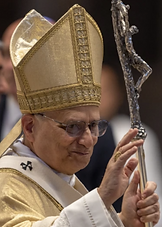
Pope Leo's Prayer Intention for January
For prayer with the Word of God
Let us pray that praying with the Word of God be nourishment for our lives and a source of hope in our communities, helping us to build a more fraternal and missionary Church.

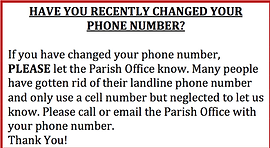
POSTER BOARD















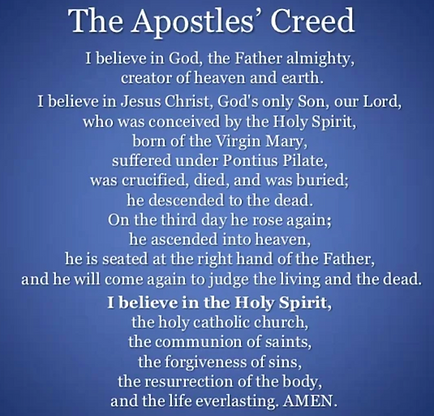
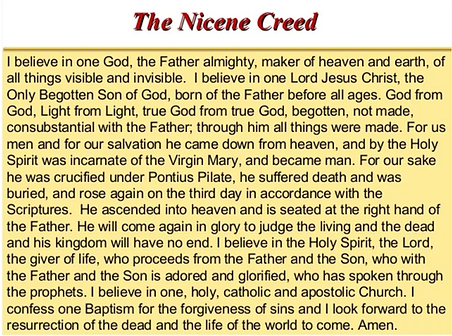


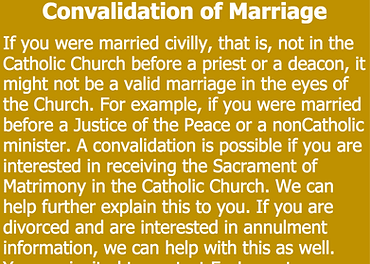


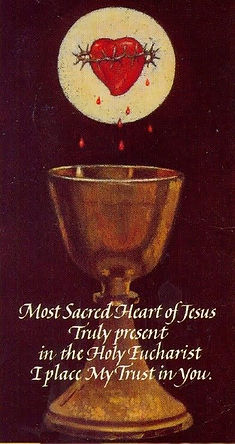
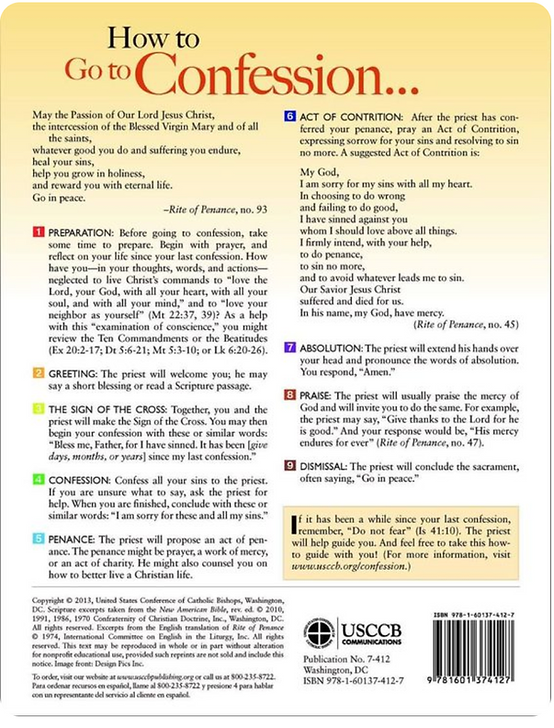





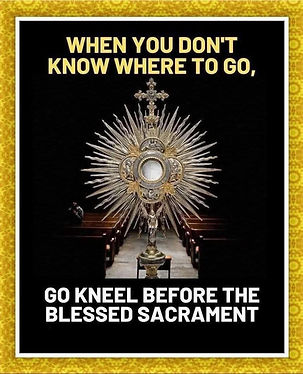



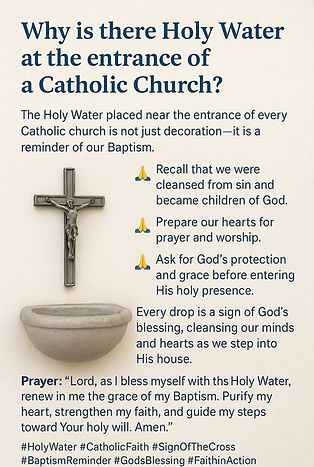

What the month of January means to Catholics and how to honor it in your home.
Did you know that in the Catholic Church, each month of the year has a devotional theme? January is the month of the Holy Name of Jesus, and it’s an ideal time to strengthen our connection to the beautiful name of our Lord. In fact, all names are to be treated with respect. Do you know the meaning of your own name? It’s interesting to discover. A name is an emblem of one’s dignity but the name of Jesus in particular should be held in the highest regard; spoken and heard only in a sacred way.
he beautiful name “Jesus” means, “God saves.” So the name of Jesus is not only the name of our Savior but also, by its meaning, states the purpose of His existence, reminding us of the incredible blessing of salvation. Let us therefore give that name great honor! Also, let us remember that Jesus’s name in Aramaic is “Yeshua” So that is what Jesus was called in his own native language (the name Joshua is derived from this name, too).
1. Take a stand against taking the Lord's name in vain.
Turn the channel, turn off the television, or walk out of the movie theater when you hear God’s name taken in vain, which has become all too frequent. Vow never to take the Lord’s name in vain (sounds like a perfect New Year’s resolution!) and to make reparation immediately if you accidentally do or if you hear someone else do so. How can you make reparation? One way is to have this perfect aspirational prayer at the ready (it’s so easy to memorize): “Admirable is the name of God.” That prayer of praise for the Holy Name of God given to Sr. Marie of St. Peter is also a prayer of reparation for blasphemy.
2. Bow your head when you hear the name of Jesus.
Adopt the pious practice (that used to be more widely practiced and is so meaningful and fitting) of bowing your head whenever you say or hear the name of Jesus (just as we should bow or genuflect before the Real Presence in the tabernacle or make a sign of the cross as we pass a Catholic Church). Scripture tells us: “At the name of Jesus every knee should bend of those in heaven, on earth, and under the earth” (Phil 2:10). The Council of Lyons in 1274 stated: “Each should fulfill in himself that which is written for all, that at the Name of Jesus every knee should bow; whenever that glorious Name is recalled, especially during the sacred Mysteries of the Mass, everyone should bow the knees of his heart, which he can do even by a bow of his head.” This devotion also helps to make amends for blasphemous use of the Holy Name.
3. Decorate your table
Decorate in colors of white (first half of January is the liturgical season of Christmas, represented by liturgical color of white for purity) and green (second half of January begins ordinary time with the liturgical color green representing hope as a sprouting seed) and the letters IHS, perhaps decorated and framed. You can make this yourself with colored pencils, or gold and silver markers. IHS is a Christogram (combination of letters representing the Holy Name). St. Bernardino, a saint devoted to the Holy Name of Jesus, would hold up the monogram of Christ’s Name — the letters “IHS” (surrounded by rays — for veneration. Why not try this in your own home?
4. Celebrate the Feast of the Holy Name of Jesus on January 3 by going to Mass or Eucharistic Adoration.
As you pray, try paying special attention to these words of the Our Father, “hallowed be Thy Name,” and purpose to live according to that teaching: helping to keep holy the name of God.
5. Write his name on your house – literally!
As Mary’s son is adored and worshiped by the three Wise Men, let us adore him, too. Literally write the name of Christ upon your house as you celebrate Epiphany! For the Feast of the Epiphany, it is beautiful to bless your home with the “CMB” written in chalk over your front door, which not only stands for Caspar, Melchior, and Balthasar, the traditional names of the three kings, but is also an abbreviation of “Christus mansionem benedicat“ (may Christ bless the house). And when the blessing of the house is done, why not enjoy some Epiphany Cake, otherwise known as King Cake in New Orleans (in France, Galette des Rois), to usher in the Mardi Gras season that will lead up to Shrove Tuesday, just before the start of Lent. Recipes abound online. Here’s a good one.
6. Daily ask for Mary and Joseph's intercession.
The name of Jesus, which means Savior, was revealed to Joseph in a dream and to Our Lady at the Annunciation. Pray to Joseph and Mary to increase your love for their Son, along with your reverence for His Holy Name.
7. Add a special prayer this month.
Pray or begin a novena to St. Bernardine of Siena, who had a special devotion to the Holy Name of Jesus. Or pray one of the prayers to the Holy Name of Jesus found here. Or pray the Golden Arrow Prayer in reparation for blasphemies against His Most Holy Name.
8. Sing a praise song!
Listen (and even sing along) to the Catholic hymn “At the Name of Jesus” and/or to “What a Beautiful Name Is This” by Hillsong Worship. Both are great songs to give the Holy Name praise and honor.
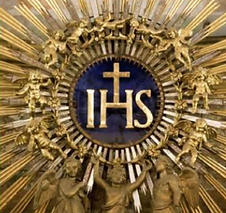
Why do Eucharistic miracles matter today?
Eucharistic miracles aren’t just stories from centuries past; they are God breaking into our world.
Eucharistic miracles aren’t just stories from centuries past; they are God breaking into our world to remind us that the Eucharist is not a symbol, not a metaphor, but the real Body and Blood of Jesus Christ.
And in an age filled with distraction, doubt, and disbelief, these miracles speak with startling clarity: He is here.
Throughout history, God has confirmed the Real Presence through visible signs—bleeding Hosts, incorrupt fragments of flesh, or sudden transformations witnessed by priests and laypeople alike.
Some of the most well-known Eucharistic miracles include:
Lanciano, Italy (8th century): A doubting priest saw the Host become real flesh and the wine become blood. Scientific studies in the 1970s confirmed that the tissue is human heart muscle.
Buenos Aires, Argentina (1996): A consecrated Host found on the ground turned into a bloody fragment of heart tissue. Independent lab results matched the same indicators found in Lanciano.
Bolsena-Orvieto (1263): During Mass, blood dripped from a consecrated Host onto the corporal, prompting Pope Urban IV to declare the Feast of Corpus Christi.
These aren’t legends—they are documented, studied, and preserved, offered to us as moments of grace and evidence of Christ’s unfailing promise.
The Teen Who Catalogued the Miraculous
In the early 2000s, a young Italian boy—Blessed Carlo Acutis—felt compelled to share these miracles with the world.
Before his death at just 15, Carlo created a meticulous, beautifully designed website cataloguing Eucharistic miracles from around the globe. His goal?
“To help people realize that the Eucharist is truly Jesus.”
His work continues to inspire millions. Today, his exhibit has traveled to churches and schools worldwide, helping the faithful rediscover the wonder of the Real Presence through history, science, and testimony.
Carlo often said:
“The Eucharist is my highway to heaven.” And he wanted it to be ours too.
Carlo was canonized a Saint on September 7, 2025 - St. Carlo Acutis - the 1st Millenium Saint.
Why These Miracles Still Matter
Because every Eucharistic miracle points back to the same truth the Church has proclaimed from the beginning:
Christ keeps His promise.
Christ stays with His people.
Christ gives Himself—wholly, completely, and without reserve
— under the humble appearance of bread and wine.
In a world that often demands proof, these miracles invite us into faith; in a world that forgets the sacred, they call us to kneel again before the God who becomes our food.
Here are 37 Miracles of Jesus Christ and there are many more. Check on the internet the Eucharistic Miracle
List recorded by St. Carlo Acutis - www.miracolieucaristici.org/en/liste/list.html.
